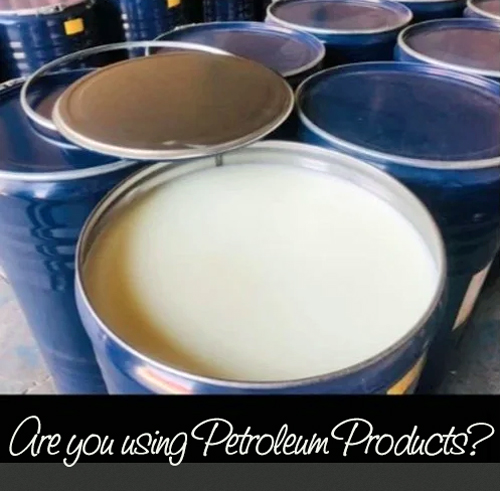When I was in my mid-twenties I realized that I had gone several months without a period. I had always been irregular, and at the time I had a very stressful job but this seemed wrong; I had no reason to consider a pregnancy. I mentioned it to a woman in my bible study group that I trusted and she said that she had gone through a similar situation. She asked me about things I ate and I mentioned that I was using soy milk instead of cow’s milk. She told me to find another way to replace the cow’s milk. She asked me if I used petroleum products. I didn’t know. She told me that it would be called Vaseline or petroleum jelly or a few other names in the list of ingredients on my personal hygiene products.
I did use Vaseline. It seemed to help keep my skin clear on my hands and other places on my body where I had psoriasis breakouts. But I was shocked to find that it was in all my personal hygiene products: my soap, shampoo, conditioner, lotions, makeup, everything. After I switched over to almond milk and was able to replace all my personal care items my cycles returned to normal. I also noticed that I had fewer psoriasis breakouts and in fewer areas. This leads me to ask: Are you using Petroleum Products?
What is Petroleum?
Petroleum jelly is a hydrocarbon-based product made of the left over mineral oils and waxes from oil and gas production that form a semi-solid jelly-like substance. Manufacturers refine the hydrocarbon compounds to create the petroleum jelly and filter out any undesirable impurities. While some data suggests compounds, specifically, Mineral Oil Aromatic Hydrocarbons and polyaromatics, found in petroleum jelly could cause cancer in typical use, there is limited evidence to support this claim. According to their research, the ingredient remains safe in cosmetics, topical ointments and even in foods when processed properly. On labels Petroleum Jelly may also appear at Petrolatum, Mineral Oil, Liquid Paraffin, or Paraffin Oil.
Why is Petroleum Jelly Used in Personal Hygiene Products?
Petroleum jelly is said to be effective in keeping skin moist during healing of minor wounds and rashes as long is skin is properly cleaned and dried before application. It holds in moisture by creating a waterproof barrier on the skin. Oil is an effective way to remove makeup. Petroleum jelly can reduce the look of split ends and add shine to your hair. It can also make perfume last longer when added to the base.
Why Should We Avoid Products with Petroleum In it?
Some people are more sensitive and can develop allergies if they use petroleum-derived products. Some people suffer from clogged pores and breakouts when they use petroleum products. Petroleum products are not meant to be ingested in any way. Do not get it in your eyes or use it internally in any way. It is not meant to be a vaginal lubricant or for masturbation and may cause bacterial infections.
While petroleum jelly creates a waterproof barrier on your skin, it also blocks pores and can lock in residue, dirt, grime and bacteria. This is why petroleum jelly should not be used on a burn or sunburn because it locks in heat and stops the body from being able to heal itself.
Also there are no nutrients in petroleum products for your skin to absorb, so while your skin looks healthy, it is not actually being nourished because your skin can’t metabolize it; it just sits there until it wears off. Petroleum products are hard to wash off because they are not water soluble.
There is a study that shows that these hydrocarbons can be stored in fat tissues within the body and because of the barrier that mineral oil/petroleum jelly creates on the skin there is a potential to cause collagen breakdown in the skin. By coating and blocking the skins natural ability to breathe and absorb nutrients this slows the cell renewal process and causes the skin to pull necessary moisture and nutrients from within the body, using petroleum products can cause wrinkles.
Since petroleum jelly is a byproduct of the oil refining process it is not sustainable and eco-friendly which is another problem with using it. Although the packaging and safety information claims that all the harmful components have been removed before use in beauty and personal care products, there is always a chance that there are still harmful hydrocarbons left behind in the petroleum jelly that might have been used in your shampoo, conditioner, moisturizer, lotion, soap or any other personal hygiene item that uses petroleum products in its production.
Petroleum jelly contains chemicals called xenoestrogens which may act as hormone receptors in the body that lead to estrogen dominance in the body. This is especially a problem if your body doesn’t have enough progesterone in your body to balance this. This problem can be linked to infertility, menstrual problems, accelerated aging, allergies, autoimmune problems, nutrient deficiencies, sleep problems and many types of cancers. Some petroleum based products contain harmful chemicals like 1,4 dioxane which causes several types of cancer. You can also get lipid pneumonia by inhaling petroleum jelly.
What Should You Use Instead of Petroleum Jelly?
Luckily there are many healthy and lovely smelling natural ingredients available to shop for that wont hurt the earth or your pocketbook instead of Petroleum Jelly products.
- Almond Oil – Fragrance free and nourishing. Good source of vitamin E, zinc, proteins and potassium.
- Beeswax – Shouldn’t be used alone but blended with other oils. A great substitute for waterproof and protective properties without hydrocarbons.
- Cocoa Butter – High in antioxidants and beneficial fatty acids, there is some evidence that is may reduce signs of aging. It can cause breakouts so try a test patch to see if you are sensitive before using all over.
- Coconut Oil – Can be used externally and internally. Good source of fatty acids, lauric acid, vitamins E and K, and anti-inflammatory compounds. It can cause breakouts so try a test patch to see if you are sensitive before using all over.
- Grapeseed Oil – Good source of vitamin E and essential fatty acids. Offers antioxidant, antimicrobial and anti-inflammatory properties.
- Olive Oil – Contains vitamins A, D, E and K and is a good moisturizer.
- Jojoba Oil – Naturally resembles sebum, naturally produced by the body to nourish and protect skin.
- Rose Hip Seed Oil – Has moisturizing and anti-aging properties, essential fatty acids and antioxidants and vitamin A.
- Sunflower Seed Oil – High in vitamin E and absorbs easily into the skin.
- Shea Butter – Contains vitamins A, E and F and beneficial fatty acids to increase collagen and reduce inflammation.
This is just a few of many healthy and natural ingredients that are good for your body and your pocket book.
The other day I posted on Facebook how difficult it was for me to find an over the counter medicated lip balm for my chapped lips that didn’t have petroleum products in it in my town. I was so shocked. Usually I just use my favorite product, but I was out and the product I was using was not cutting it. If we all knew what we were putting on our bodies and were more mindful of the items we don’t want to buy, stores would be more willing to stock healthier products and the products would probably be at better prices too because higher demand causes prices to change eventually.
I hope that this article educates you to look at labels and ask questions because your skin is your largest organ. What you put on it is absorbed and becomes part of your body. Feed it well. You deserve the best.
If you are needing help creating a Wellness Plan that works for you, please Contact Wellness Works NW at 360-447-8061. Karen G Clemenson is a very caring and authentic person and she is looking forward to talking with you and helping you define your Wellness Goals and strategies. I hope this article answered questions you had and was easy to understand. If you would like us to write about a particular topic that you can’t find on this site, please send us an email on our Dear Jamie page and someone from Our Team will be glad to research and write about your topic.
Read More at:
- Beyond Coconut: 7 Other Natural Oils for Smooth and Radiant Skin by Jamie Ludwig, medically reviewed by Ross Radusky, MD for Everyday Health July 6, 2020
- Everything You Need to Know About Petroleum Jelly by Daniela Ginta and Medically reviewed by Deborah Weatherspoon, Ph.D., MSN for Healthline March 13, 2023
- Is Petroleum Jelly Bad For You? by Adina F. for Avacare Medical Blog November 29, 2022
- Trending – Petroleum Jelly by Elisabeth Anderson; Joe Zagorski for Michigan State University Center of Research on Ingredient Safety February 20, 2023
- Why I Don’t Use Petroleum Jelly (And What I Use Instead) by Katie Wells for WellnessMama.com May 19, 2020
Related Articles
I hope this article helps Fuel Your Wellness. Please leave your comments below.
 Summer D Clemenson is a co-owner Clemenson Enterprises, LLC and Wellness Works NW. Summer her wife, Karen G Clemenson’s personal motto is Creativity, Honesty & Positivity are a must! This mantra helps them stay community and wellness minded in all they do. Summer is an Independent Wellness Advocate at dōTERRA. Summer also writes poetry and inspirational blogs @ GoodTimesAlways.com. Her crochet art can be viewed and purchased @ KnottyWares.com & she loves special orders!
Summer D Clemenson is a co-owner Clemenson Enterprises, LLC and Wellness Works NW. Summer her wife, Karen G Clemenson’s personal motto is Creativity, Honesty & Positivity are a must! This mantra helps them stay community and wellness minded in all they do. Summer is an Independent Wellness Advocate at dōTERRA. Summer also writes poetry and inspirational blogs @ GoodTimesAlways.com. Her crochet art can be viewed and purchased @ KnottyWares.com & she loves special orders!
~













